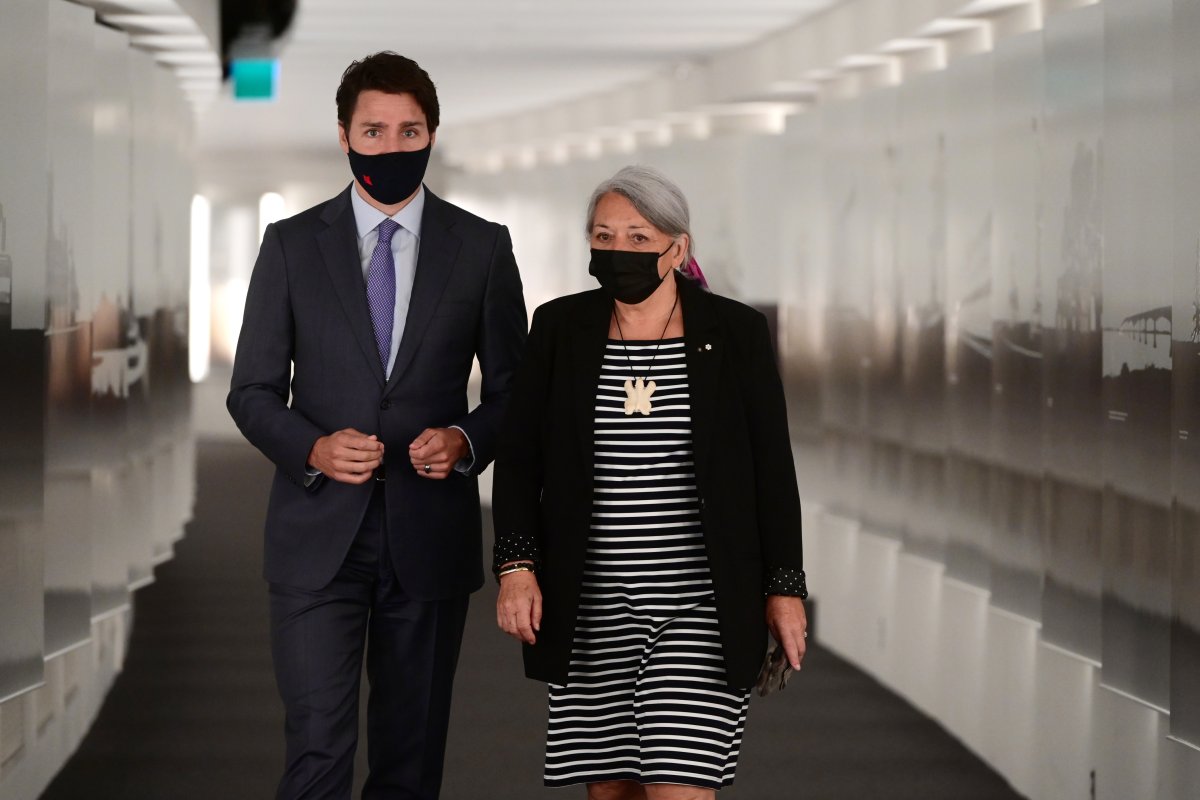There’s a range of perspectives in the Maritimes about Mary Simon becoming Canada’s 30th governor general, including suggestions that the appointment is a “political play” to dodge focus on residential schools.

A Nova Scotia First Nation chief is just hopeful Simon can “make sure Canada honours the treaties” as a representative of the Queen.
But Chief Mike Sack, of the Sipekne’katik First Nation, isn’t overly confident that will happen.
“She was appointed by the prime minister of Canada to kind of look over Canada, so it’s probably a hand-selected position, for sure,” he says.
But Sack calls her appointment a step towards reconciliation.
“It’s a historic day and it’s great to see,” he tells Global News in a Zoom interview. “We’re optimistic that great things will come from it.”
Simon, who becomes commander-in-chief, was sworn in Monday.
Prime Minister Justin Trudeau named Simon, an Inuk leader and former Canadian diplomat, as his choice to be the Queen’s representative in Canada earlier this month, replacing Julie Payette, who resigned in January.
Governors general are responsible for constitutional duties and representing the country.
A Narrative Research poll of 12,000 Canadians shows 76 per cent of Canadians support her appointment, with approval numbers slightly higher in the Atlantic region.
Despite that, there have already been hundreds of formal complaints — about her language.
Simon is bilingual, speaking English and Inuktitut, but not French.
She did, however, recommit to learning the language in her speech Monday.
“I’m having a little trouble pronouncing, but I’m learning,” she said, and thanked Canadians who have reached out to her over recent weeks to express their support as she vows to work at learning French.
Société de l’Acadie du Nouveau-Brunswick (SANB), or New Brunswick’s Acadian Society, wasn’t available for an interview Monday on the subject because it is “before the courts contesting the nomination of the current Lieutenant Governor of New Brunswick, Her Honour The Honorable Brenda Murphy.”
Murphy is an anglophone in a bilingual province, which prompted SANB to take legal action against “the process that led her to be nominated,” said Ali Chaisson, the organization’s executive director in December 2019.
People who spoke to Global News Monday afternoon in Moncton had differing perspectives on the issue of Canada’s governor general not being fluent in its two official languages.
“I feel it’s a bit of an issue given that there is such a strong and present French community in the city and province in general,” said Karine LeBlanc.
“That seems to be a big oversight, in my opinion,” Rodney Seguin said.
“If she has the qualifications, why not?” asked Rita Oulton. “She doesn’t speak French? You know what, she’s willing to learn. I don’t see a big deal.”
“No matter what it is, people are too picky,” Gary Francis Musgrave said. “She doesn’t speak Français, well she doesn’t. Doesn’t mean she’s (any) less of a person.”
- Honda expected to announce Ontario EV battery plant, part of a $15B investment
- Trudeau says ‘good luck’ to Saskatchewan premier in carbon price spat
- Canadians more likely to eat food past best-before date. What are the risks?
- Hundreds mourn 16-year-old Halifax homicide victim: ‘The youth are feeling it’
Others say the appointment is political.
Bryanne Duffy, whose grandmother is a residential school survivor, said Simon’s appointment was “convenient timing.”
“Not to take away from … it’s a great thing that she’s being brought in as governor general, don’t get me wrong,” Duffy said. “But I feel like it’s more of a political play than anything and it’s just something to take the heat off of residential schools.
“It is hopefully a step in the right direction.”
—With files from The Canadian Press






Comments